State of the Nation Address
When President Jacob Zuma took to the podium to deliver his State of the Nation Address recently, he did not only paint a picture of the reality that our country faces, but he also offered South Africans some solutions.
A united South Africa, in which all sectors working together for the good of the nation, is what is required for the country to rise above the tough economic conditions and other challenges it is currently facing.
This is the message President Jacob Zuma had for South Africans. The President emphasised that getting down to the business of pursuing an economic turnaround was not only governement’s responsibility but a shared responsibility between members of the business sector, labour and citizens.
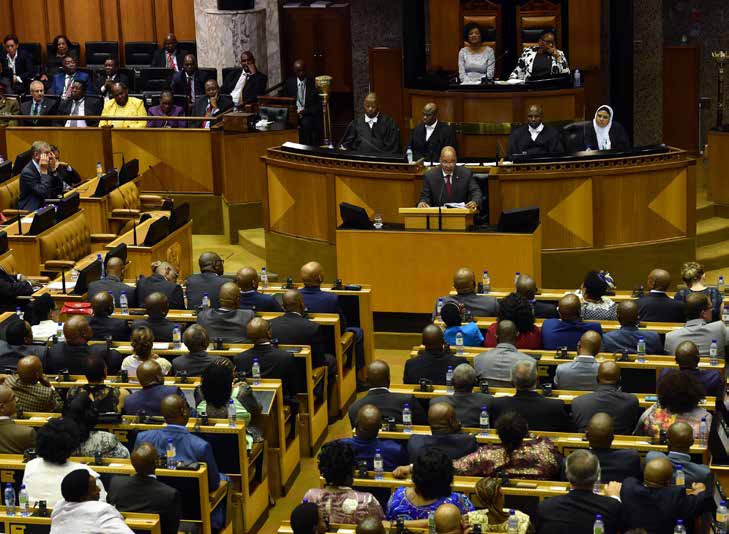
Economy a victim of global financial climate
Speaking on the importance of a healthy economy, the President said a resilient and fast-growing economy was at the heart of South Africa’s radical economic transformation agenda and the National Development Plan (NDP).
“When the economy grows fast it delivers jobs. Workers earn wages and businesses make profits. The tax base expands and allows government to increase the social wage and provide education, health, social grants, housing and free basic services faster and in a more sustainable manner,” said President Zuma.
The President said the economy had faced difficulties since the 2008 global financial crisis and although South Africa embarked on an aggressive infrastructure development programme to stimulate growth, the country was affected by the international economic climate.
“Global growth still remains muted. Financial markets have become volatile. Currencies of emerging markets have become weak and they fluctuate widely. The prices of gold, platinum, coal and other minerals that we sell to the rest of the world have dropped significantly and continue to be low,” he said.
He noted that the economies of two of South Africa’s BRICS partners, Brazil and Russia, were expected to contract and that China’s economy would not grow as strongly as normal. “Because our economy is relatively small and open it is affected by all these developments,” explained the President.
These developments and domestic challenges such as electricity constraints and sometimes unstable industrial relations affected the local economy, which the International Monetary Fund and World Bank predict will grow by less than one per cent this year. This suggests lower than expected revenue collection.
There was also the risk of ratings agencies downgrading South Africa’s investment status. If this happens it would affect everyone. “It will become more expensive for us to borrow money from abroad to finance our programmes of building a better life for all, especially the poor,” cautioned the President. It is against this stark economic picture that President said the situation required an effective turnaround plan comprising various responses.
Spending Wisely
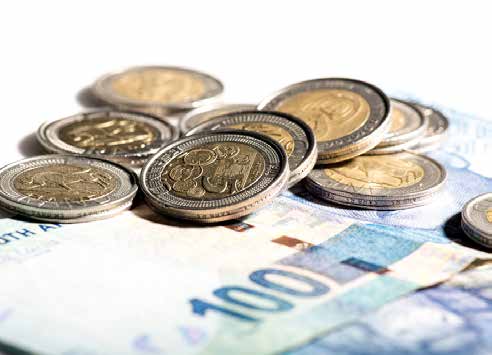 “A big expenditure item that we would like to persuade Parliament to consider is the maintenance of two capitals, Pretoria as the administrative one and Cape Town as the legislative capital,” noted the President. Currently Cape Town is the seat of Parliament and Parliament is the administrative capital. He pointed out that having two capitals entailed duplicate expenses on such things as accommodation and transportation, among others. Government had undertaken to spend public funds wisely and cut wasteful expenditure without “compromising on the core business of government and the provision of services,” said President Zuma.
“A big expenditure item that we would like to persuade Parliament to consider is the maintenance of two capitals, Pretoria as the administrative one and Cape Town as the legislative capital,” noted the President. Currently Cape Town is the seat of Parliament and Parliament is the administrative capital. He pointed out that having two capitals entailed duplicate expenses on such things as accommodation and transportation, among others. Government had undertaken to spend public funds wisely and cut wasteful expenditure without “compromising on the core business of government and the provision of services,” said President Zuma.
The cost-containment measures the Minister of Finance announced in 2013 decreased excessive and wasteful spending by government, but more steps would be taken to cut wastage. The President said overseas trips would be shortened, strong motivations for trips abroad would be required and the sizes of delegations would be cut down and standardised. There would also be further restrictions on conferences, catering, entertainment and social functions.
Government departments would no longer host budget vote dinners for stakeholders after the delivery of budget speeches in Parliament. The executive management and boards of public agencies and state-owned companies (SOCs), as well as the Premiers of the provinces and Mayors were expected to join national government in eliminating wasteful expenditure.
The President said although the country is faced with challenges, the positive attributes outweighed the challenges. This meant South Africa remained an attractive investment destination. “We must continue to market the country as a preferred destination for investments. This requires a common narrative from all of us as business, labour and government.”
Important anniversaries 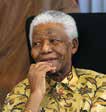
President Jacob Zuma deliverd his 2016 State of the Nation Address on the 26th anniversary of the release of President Nelson Mandela from prison. Several other important anniversaries will be marked in 2016, including:
- Twenty years ago President Nelson Mandela signed into the law the Constitution at Sharpeville.
- Thirty years ago the Gugulethu Seven, an anti-apartheid group, were ambushed and killed by the police in Cape Town.
- This year marks 40 years since the June 16 youth uprising in Soweto.
- Fifty years ago the government of the day declared District Six in Cape Town a whites-only area. As a result over 60 000 residents were forcefully removed to the Cape Flats.
- Sixty years ago on 9 August 1956 – 20 000 women marched to the Union Buildings to protest the pass laws. Women from as far away as Port Elizabeth and Cape Town participated.
- On 20 May the centenary of the University of Fort Hare in the Eastern Cape, described by President Zuma as a critical milestone in the liberation history of South Africa and Africa, will be celebrated.
- A memorial marking the dignity and humanity of scores of black soldiers who fought in the Battle of Delville Wood - a series of engagements in the 1916 Battle of the Somme - in France, in the First World War, will be unveiled in France in July.
Matters of business
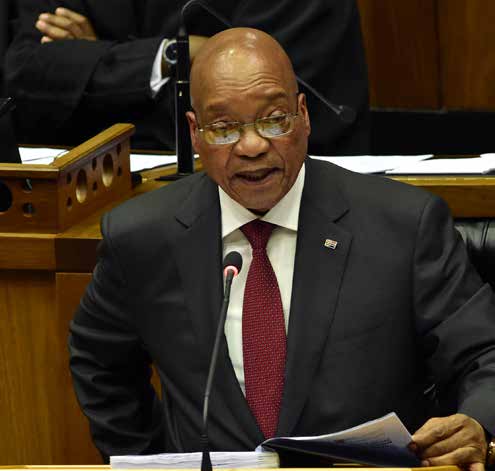 Just before the State of the Nation Address, President Zuma held a meeting between chief executive officers and others from the business community. Here it was decided that South Africa needed to have the correct investment support infrastructure.
Just before the State of the Nation Address, President Zuma held a meeting between chief executive officers and others from the business community. Here it was decided that South Africa needed to have the correct investment support infrastructure.
The President announced that a positive and encouraging outcome of government’s discussions with business would be the launch of a project by the country’s banks– through the Banking Association of South Africa - aimed at establishing a centre of excellence for financial services and leadership training. This would ensure that the country could attract, nurture, develop and retain the best talent in financial services.
Government was also developing a “One-Stop Shop/Invest SA” initiative to indicate that South Africa was “truly open for business”. The President said government would speed-up this initiative’s implementation together with the private sector and would help by removing red tape and reviewing legislative and regulatory obstacles.
“Economic transformation and black empowerment remained an essential part of all of government’s economic programmes,” he added. To increase the success rate and growth of new ventures embarked on by small, medium and micro enterprises high quality, innovative support was necessary. The Department of Small Business Development was established for this reason. Another intervention was the Black Industrialists Scheme which was launched to “promote the participation of black entrepreneurs in manufacturing”, said the President. Big business was encouraged to work with the new manufacturers including businesses owned by women and the youth to help broaden ownership and control of the economy.
The country also had to take advantage of the exchange rate and recent changes to visa regulations to grow inbound tourism. In addition, domestic tourism had to grow. “SA Tourism will invest R100 million a year to promote domestic tourism, encouraging South African to tour their country,” the President announced.
Peacekeepers
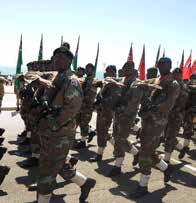 In celebration of Armed Forces Day on 21 February 2016 the South African National Defence Force demonstrated its capability in Port Elizabeth from 13 to 21 February. The South African Navy hosted the event.
In celebration of Armed Forces Day on 21 February 2016 the South African National Defence Force demonstrated its capability in Port Elizabeth from 13 to 21 February. The South African Navy hosted the event.
Armed Forces Day coincides with the commemoration of the sinking of the SS Mendi within 20 minutes on 21 February 1917 during the First World War. Of the 647 soldiers who died, 616 were South Africans.
DID YOU KNOW? National Development Plan (NDP)
The NDP is government’s longterm plan to eliminate poverty,reduce inequality and ensure South Africans enjoy a decent standard of living by 2030.
People with a decent standard of living have things such as housing, water, electricity and sanitation; quality health care; social protection; employment; and quality education and skills development present on this occasion.
THE YEAR THAT WAS
Reflecting on 2015, President Zuma reminded the nation that in February 2015 he had announced the Nine-Point Plan in response to slow growth. He reported that there had been significant progress in implementing the plan and in stabilising the country’s electricity supply, with the country experiencing no load shedding since August 2015. This has been a relief to households and industry.
State-owned companies
While concerns have been raised about the performance of state-owned entities and (SOCs), President Zuma pointed out that many SOCs were performing well. Sanral had built some of the best roads in Gauteng and in other parts of the country and Transnet had built rail infrastructure that allowed the country’s mines to transport commodities through South Africa’s ports to markets worldwide.
“Our development finance institutions such as the Industrial Development Corporation (IDC) or Development Bank of Southern Africa and others have provided finance for infrastructure, various industries and agricultural businesses without fail, even in the aftermath of the global financial crisis, said the President. SOCs had to be financially sound, properly owned and managed if they were to contribute to the successful implementation of the NDP.
“We will ensure the implementation of the recommendations for the Presidential Review Commission on State Owned Enterprises which outlines how the institutions should be managed,” the President promised. The task of ensuring that the recommendations were implemented fell to the Inter-Ministerial Committee chaired by the Deputy President, Cyril Ramaphosa.
"SOCs that were no longer relevant to South Africa’s development agenda would be phased out," President said.
Uniting to overcome challenges
Citizens must set aside racism and pursue social cohesion - diverse people joining hands and standing together in solidarity as members of one nation - so that they could be united in their response to the challenges that face South Africa, said President Zuma.
“If there are any disagreements or problems between us we should solve them before they escalate. This is necessary for the common good of our country,” he stressed. In an effort to confront racism, 21 March 2016, Human Rights Day, would be used to lay the foundation for a long-term programme for building a non-racial society, said the President.
Agriculture and land reform
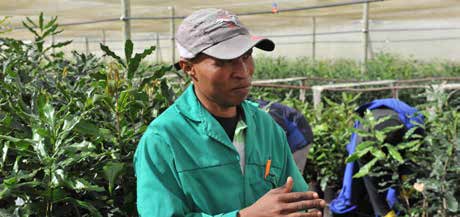 With regard to revitalising agriculture, the President said that construction had begun on at least five Agri-parks, namely Westrand in Gauteng, Springbokpan in North West, Witzenberg in the Western Cape, Ncora in the Eastern Cape and Ekangala in Mpumalanga. The Agri-parks programme that was introduced in 2015 is aimed at increasing smallholder farmers’ participation in agricultural activities.
With regard to revitalising agriculture, the President said that construction had begun on at least five Agri-parks, namely Westrand in Gauteng, Springbokpan in North West, Witzenberg in the Western Cape, Ncora in the Eastern Cape and Ekangala in Mpumalanga. The Agri-parks programme that was introduced in 2015 is aimed at increasing smallholder farmers’ participation in agricultural activities.
In 2015 President Zuma spoke about the 50/50 policy framework that proposed relative rights for people who work on farms. In response, 27 proposals had been submitted, of which four were being implemented in the Eastern Cape and Free State.
The President also said the draft Regulation of Land Holdings Bill would be presented to Cabinet in the first semester of 2016. The Bill would place a ceiling on land ownership at a maximum of 12 000 hectares and would prohibit foreign nationals from owning land.
They would however be eligible for long-term leases. In 2015 the re-opening of land claims for people who had missed the 1998 deadline was also announced. The President said that by December last year close on 120 000 land claims had been lodged.
Energy
The President announced that government had invested R83 billion in Eskom. This made it possible for the entity to continue investing in the Medupi (in Limpopo) and Kusile (in Mpumalanga) power plants while sustaining a diligent maintenance programme. Additional units from Ingula power station (on the border of Free State and KwaZulu-Natal) would be connected in 2017, with some synchronisation expected to start in 2016. President Zuma said the multiple bid windows of the Renewable Independent Power Producer Programme attracted a R194 billion investment.
“This initiative is a concrete example of how government can partner with the private sector to provide practical solutions to an immediate challenge.” The President announced that in 2016 government would select the preferred bidders for the coal independent power producer and that requests for proposals would also be issued for the first windows of gas-to-power bids.
The nuclear energy expansion programme remained part of the future energy mix with the plan being to introduce 9 600 megawatts of nuclear energy in the next decade in addition to running the Koeberg Nuclear Power Plan in the Western Cape.
Government would test the market to determine the true cost of building modern nuclear plants, emphasising that South Africa would “only procure nuclear on a scale and pace that our country can afford,” he added.
DID YOU KNOW? Chinese investment
South Africa took part in the India-Africa Summit and also the Forum on Cooperation between Africa and China. China had announced investments of US$50 billion of which South Africa would get $10 billion for infra-
Manufacturing
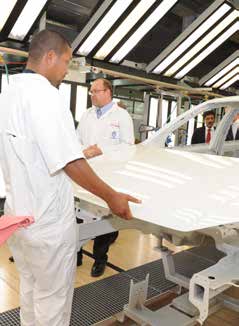 The Department of Trade and Industry introduced various successful incentives in recent years to stimulate investment in the manufacturing sectors, especially the textile, leather and automotive segments.
The Department of Trade and Industry introduced various successful incentives in recent years to stimulate investment in the manufacturing sectors, especially the textile, leather and automotive segments.
The incentives for the automotive sector attracted investments of over R25 billion over the last five years. “We welcome key investments from Mercedes, General Motors, Ford, Beijing Auto Works, the Metair group, BMW, Goodyear and VW,” said President Zuma, adding that the clothing and textile sector had also been stabilised after a few difficult years.
He added that “multinational companies such as Nestlé, Unilever, Samsung and Hisense have also affirmed South Africa as a regional manufacturing hub. They have retained and expanded their investments in new plants. Indeed the progress made in manufacturing has certainly demonstrated that the incentive programmes are effective and attractive to investors.”
Human Rights Day
Human Rights Day is commemorated on 21 March to remind South Africans of the sacrifices made in pursuit of democracy in South Africa such as the Sharpeville Massacre. On 21 March 1960 people from Langa and Sharpeville marched in protest against the pass laws. The police shot and killed 69 protesters in Sharpeville.
This year’s Human Rights Day on 21 March will be commemorated as the ‘National Day against Racism’ and laying the foundation for a long-term programme of building a non-racial society.
Water
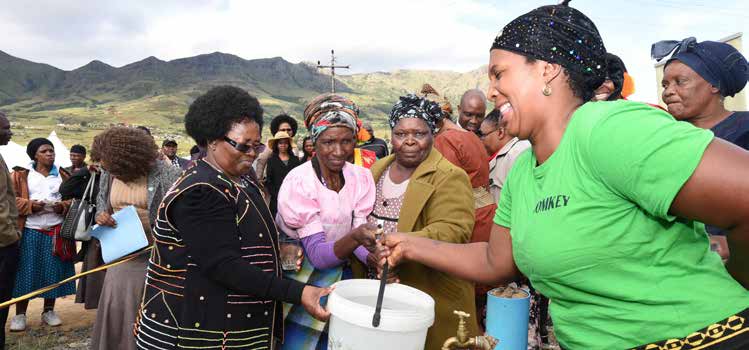 He noted that both government and civil initiatives such as Operation Hydrate were responding to communities affected by the drought in Free State, KwaZulu-Natal, Limpopo, Mpumalanga and North West. To curb water wastage, the Department of Water and Sanitation had begun its programme of training 15 000 young people as artisans.
He noted that both government and civil initiatives such as Operation Hydrate were responding to communities affected by the drought in Free State, KwaZulu-Natal, Limpopo, Mpumalanga and North West. To curb water wastage, the Department of Water and Sanitation had begun its programme of training 15 000 young people as artisans.
To increase access to water the construction of water infrastructure remained critical said the President, announcing that the first phase of the Mokolo and Crocodile Augmentation project in the Lephalale area in Limpopo was now fully operational and able to provide 30 million cubic metres of water a year to various users.
Ingula Hydro Power Station
Eskom and CMC Impregilo Mavundla Joint Venture are building a hydropower project called Ingula on the border of KwaZulu-Natal and Free State. Hydropower is electricity generated using the energy of moving water.
The Ingula Pumped Storage Scheme has an upper and lower dam about 4.6 km apart. Each dam can hold about 22 cubic metres of water. According to Eskom, they are connected by underground waterways passing through a subterranean powerhouse with four 333 MW generators.
To generate electricity during times of peak demand, water is released from the upper dam, passing through the pump/turbines, into the lower dam. During times of low demand, the pump/turbines are used to pump the water from the lower dam, back to the upper dam.
Labour, social security and mining
The President welcomed the agreement reached by social partners at the National Economic Development and Labour Council (Nedlac) on national minimum wage. “It is important to emphasise that the national minimum wage should be implemented in a manner that does not undermine employment creation, the thriving of small businesses or sustained economic growth.
“We are also encouraged by reports from Nedlac that a framework to stabilise the labour market by reducing the length of strikes and eliminating violence during strike action is being finalised,” said President Zuma. He added that within government there were ongoing talks led by the Department of Social Development and National Treasury about finalising the comprehensive social security policy.
The President noted that progress had been made in the mining sector and that stakeholders in the mining industry had signed the Leaders’ Declaration to Save Jobs. President Zuma urged parties to implement the agreement and continue finding ways of saving jobs, and appealed to business not to make retrenchments the first response when facing difficulty.
DID YOU KNOW? Science and Technology
As part of the ongoing promotion of innovation within the Nine-point Plan the Department of Science and Technology would finalise the Sovereign Innovation Fund. This public-private funding partnership is aimed at commercialising innovations.
The President explained that government would speed-up the implementation of the first phase of broadband roll out to connect over 5 000 government facilities in eight district municipalities over three years. Some R740 million had been allocated for this.
Social sector progress
President Zuma also noted that a lot of work had been done in the social sector in the past year. “Government has responded to the financial shortfall arising from the zero per cent university fee increase, as agreed in meeting with students and vice-chancellors last year.”
The Minister of Finance was expected to provide the details of education shortfall funding in the Budget speech. The President also appointed a Judicial Commission of Inquiry into higher education.
On the health front, the President noted that the life expectancy of South Africans for both males and females had significantly improved and is currently 62 years across genders, which is an increase of eight and a half years since 2005.
“The HIV policy turnaround in 2009 led to a massive rollout of HIV testing and treatment for 3.2 million people living with the virus. This has contributed immensely to healthier and longer lives for those infected.”
The next step, he said, was to revive prevention campaigns, especially amongst the youth. The Minister of Health was expected to announce a major campaign in this regard. President Zuma also announced that the state-owned pharmaceutical company, Ketlaphela, has been established. “The company will participate in the supply of anti-retroviral drug to the Department of Health from the 2016/17 financial year,” he added.
DID YOU KNOW? The Nine-Point Plan
During his State of the Nation Address in February 2015, President Jacob Zuma, among other things, announced the Nine-Point Plan to grow the economy and create much-needed jobs.
The plan consists of:
- Revitalising the agriculture and agro-processing value-chain
- Advancing beneficiation adding value to our mineral wealth
- More effective implementation of a higher impact Industrial Policy Action Plan
- Unlocking the potential of SMME, co-operativess, township and rural enterprises
- Resolving the energy challenge
- Stabilising the labour market
- Scaling-up private-sector investment
- Growing the Ocean Economy
- Cross-cutting Areas to Reform, Boost and Diversify the Economy;
- Science, technology and innovation
- Water and sanitation
- Transport infrastructure
- Broadband rollout
- State owned companies.
Making a difference
President Zuma acknowledged that, given the prevailing global economic climate, it was clear that the country would not achieve its growth target of five per cent a year by 2019 as envisaged by the NDP. “The tough global and domestic conditions should propel us to redouble our efforts, working together as all sectors. In this regard it is important to act decisively to remove domestic constraints to growth,” urged the President.
DID YOU KNOW? Black Industrialists Scheme
The Black Industrialists Scheme is an initiative of the Department of Trade and Industry. It aims to support majority black-owned manufacturing companies. The support includes access to finance, markets, skills development, and standards, quality and productivity improvement.
The Scheme offers a cost-sharing grant ranging from 30 to 50 per cent to approved entities to a maximum of R50 million. Support is aimed at manufacturing companies in the following sectors:
- Blue/Ocean economy, including vessel building and repair
- Oil and Gas
- Clean Technology and Energy
- Mineral Beneficiation
- Aerospace, rail and Automotive Components
- Industrial Infrastructure
- Information Communication Technologies
- Agro-Processing
- Clothing, Textiles /Leather and Footwear
- Pulp, Paper and Furniture
- Chemicals, Pharmaceuticals and Plastics
- Nuclear
- Manufacturing related logistics
- Designated Sectors for localisation



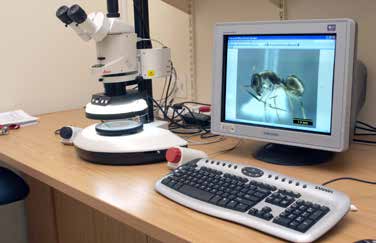
 Facebook
Facebook Twitter
Twitter WhatsApp
WhatsApp